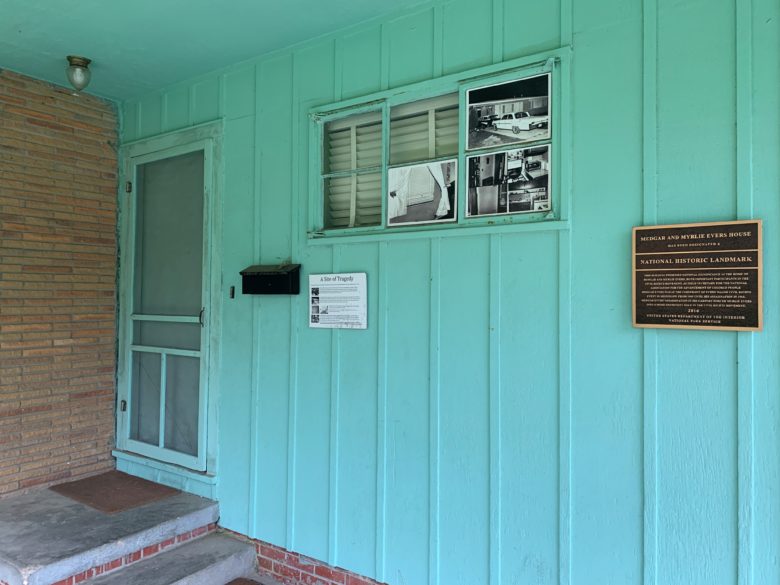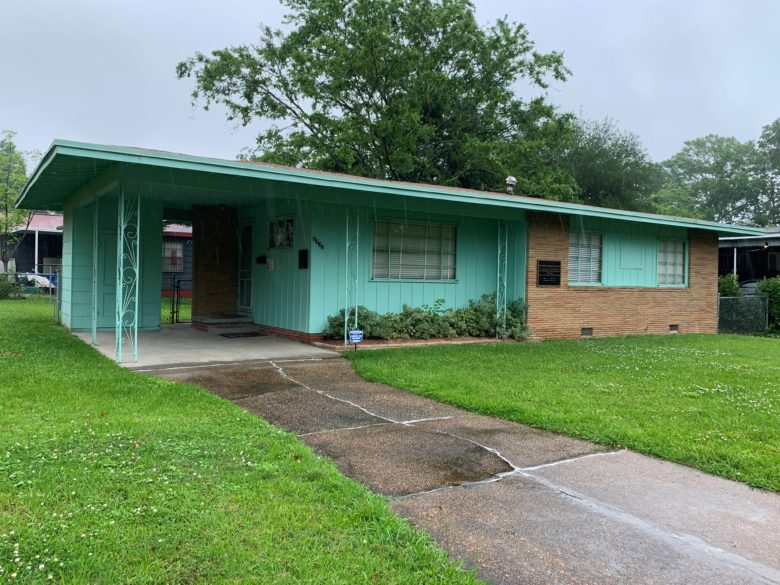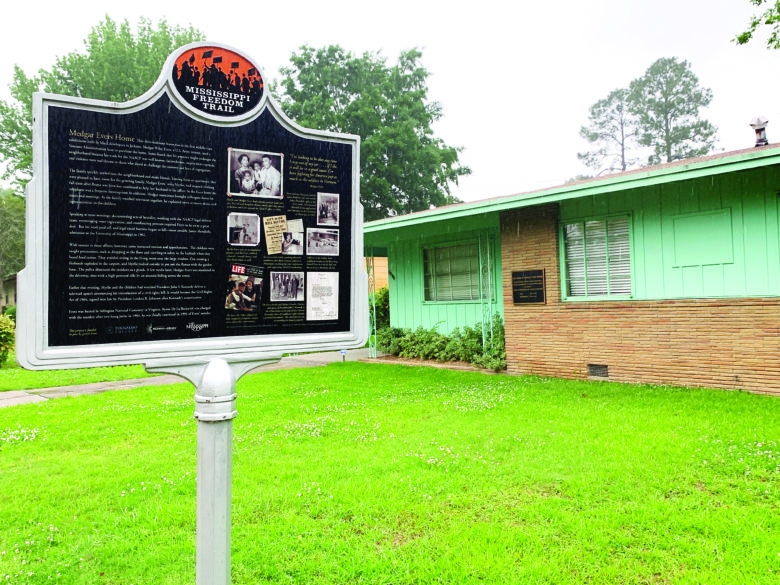From the Archives
By Mary Woodward
JACKSON – June 12, 1963, is a date that every Mississippian should remember for it was on this day that Medgar Evers was gunned down outside his home in Jackson upon returning home at night after meetings of the NAACP. It was just before midnight of June 11. Evers was the local Field Secretary and was a target of the Ku Klux Klan (KKK).
Normally, Evers’ routine upon arriving at home was to walk around the front of his car and into his house, thus putting the car between himself and the darkness where someone could be hiding. That fateful night because of items in the back of the car to be unloaded he went the opposite direction and a gunman shot from the bushes and killed him.
One of the bullets went through Evers’ body through the window of the house and into the kitchen. He bled to death in his driveway in front of his wife and children. The driveway still holds the stain of his blood. Byron de la Beckwith was convicted of the crime some 30 years later. Evers is buried in Arlington National Cemetery as he was a veteran of WWII.
During this same time, the diocesan priests and Bishop Gerow were on retreat in Bay St. Louis. Word of the assassination arrived there later that morning. The following accounts are taken from the diary of Bishop Gerow. It was a very volatile time.



“While everything is going so beautifully here at the retreat, currently, it is not going so well in Jackson in reference to the race question. I got news over the radio that today Medgar Evers, who has been the Field Secretary for the NAACP, and who, according to Father Gasper, was a fine, honest and respectable gentleman, was murdered. This murderer shot him at a distance when he was going from his automobile to his home. So far, the identity of the murderer is not known. I know that this is going to cause much trouble.”
As a point of information, the Evers sent their children to Christ the King Catholic School because they felt they would be safer there.
Bishop Gerow writes on June 14, 1963: “Naturally, the city is very much upset over the assassination of Medgar Evers. Up to this time, I have refrained from making any public statements in the newspaper. However, now the time has arrived for some sort of statement, so with the help of Father Law and Bill Minor, one of our fine Catholic newspapermen in the city, we drafted a statement and sent it to the local newspapers…and gave it to the national press and radio. Then as an act of charity…we visited the wife of the murdered man.”
“The assassination of Medgar Evers is certainly a shocking and saddening occurrence in our community and is more meaningful than the death of one man. I personally extend my heartfelt sympathy to the wife and children of Mr. Evers and convey to them my blessing and assurance of my prayers.
“I am saddened when I review the events of recent days and weeks. As a loyal son of Mississippi and a man of God, I feel in conscience compelled to speak out in the face of the grave racial situation in which we now find ourselves.
“This problem is unmistakably a moral one. We need frankly to admit that the guilt for the murder of Mr. Evers and the other instances of violence in our community tragically must be shared by all of us. Responsible leadership in some instances has been singularly lacking.
“I entreat our leaders and men of good will of both races to find some common ground on which to build a civic order based on human dignity and a concept of justice under God’s law. Rights which have been given to all men by the Creator cannot be the subject of conferral or refusal by men.
“The Declaration of Independence of this great nation has given us the proper attitude in this regard, in the words, ‘We hold these truths to be self-evident, that all men are created equal, that they are endowed by their Creator with certain unalienable Rights, that among these are Life, Liberty and the pursuit of Happiness.’
“Our conscience should compel us all to acknowledge the deep moral implications of this problem, and to take some positive steps towards recognizing the legitimate grievances of the Negro population. In the name of our common faith in God the Father let us all join together in prayer that the clouds of hate and fear may be pierced by the light of justice and fraternal love.”
Bishop Gerow received hate mail and phone calls from people, including Catholics, around the state and country for his visit to Mrs. Evers and for his statement. To one of these who expressed dismay that Bishop Gerow had visited Mrs. Evers, he replied: “I did it; I wanted the world to know it, and I was proud of the fact that I had done it because the family had suffered a tremendous injustice and it was really a national disgrace.”
The words of Bishop Gerow’s statement if put in modern terms would be very fitting to today’s climate. It seems we really are still in a climate where we need the cloud of hate and fear to be pierced by the light of justice and love.
Next issue a visit to New Orleans…
(Mary Woodward is Chancellor and Archivist for the Diocese of Jackson)
